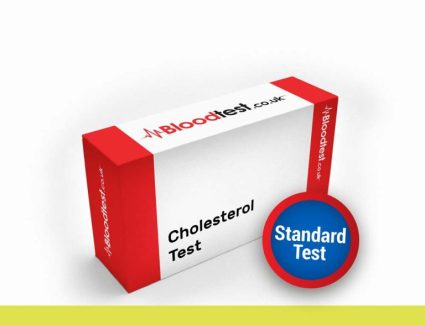Achieving Optimal Cholesterol Levels to Boost Your Health and Well-being
Discovering Cholesterol: The Essential Lipid for Bodily Functions

When you undergo a cholesterol blood test in Cannock, it is crucial to understand the importance of cholesterol, a vital fatty substance that serves numerous essential functions within the body. This lipid is fundamental for constructing cell membranes, producing key hormones, and synthesising vitamin D. Nevertheless, it is imperative to distinguish between beneficial and detrimental types of cholesterol. While our body requires a certain amount of cholesterol for optimal functioning, excessively high levels can significantly elevate the risk of cardiovascular diseases and other serious health conditions. This highlights the necessity of regularly checking cholesterol levels, especially in locations like Cannock, where lifestyle factors may exacerbate health risks.
To fully grasp the implications of a cholesterol blood test in Cannock, it is important to recognise that cholesterol circulates in the bloodstream in two main forms: low-density lipoprotein (LDL) and high-density lipoprotein (HDL). LDL, commonly referred to as ‘bad’ cholesterol, can lead to the accumulation of plaque in arteries, significantly increasing the likelihood of heart attacks and strokes. Conversely, HDL, known as ‘good’ cholesterol, assists in removing LDL from the bloodstream, thereby offering protective benefits against heart disease. Understanding the distinctions between these types of cholesterol is vital for effectively managing overall cholesterol levels and promoting cardiovascular health.
Making informed health choices can lead to significant lifestyle modifications that positively impact cholesterol levels. For example, regularly engaging in health screenings, including a cholesterol blood test, can enable individuals to identify potential health concerns before they escalate into serious conditions. This proactive approach empowers residents to take charge of their health and underscores the importance of education and easy access to healthcare services within the community.
Examining Cholesterol Types: The Differences Between LDL and HDL
To thoroughly understand cholesterol, it is vital to explore the specifics of LDL and HDL cholesterol. LDL cholesterol is infamous for its role in atherosclerosis, a severe condition characterised by the hardening and narrowing of arteries due to cholesterol deposits. This dangerous process can lead to major health complications, including heart disease and stroke. In contrast, HDL cholesterol plays a protective role, functioning as a scavenger that removes excess cholesterol from the bloodstream and transports it to the liver for elimination.
Maintaining a healthy equilibrium between these two types of cholesterol is crucial for effective management of heart health. Regular evaluations, such as a cholesterol blood test in Cannock, allow individuals to closely monitor their cholesterol levels. Knowing both LDL and HDL values can provide critical insights into one's heart health, guiding necessary lifestyle adjustments and potential medical interventions.
Another key element to consider is triglycerides, another form of fat present in the bloodstream. Elevated triglyceride levels can also increase the risk of heart disease, making it essential to monitor all aspects of your cholesterol profile. A comprehensive understanding of these components empowers individuals to make more informed lifestyle decisions, ultimately fostering a healthier community in Cannock.
 Interpreting Normal Cholesterol Ranges for Optimal Health
Interpreting Normal Cholesterol Ranges for Optimal Health
Navigating the intricacies of cholesterol levels can feel daunting initially, but acquiring this knowledge is essential for maintaining heart health. In the UK, general guidelines recommend that total cholesterol levels ideally remain below five mmol/L. For LDL cholesterol, the target is below 3 mmol/L, whereas HDL cholesterol levels should exceed 1 mmol/L for men and 1.2 mmol/L for women. These benchmarks serve as vital indicators for assessing cardiovascular health and determining whether lifestyle modifications or medical interventions are necessary.
Familiarising oneself with these cholesterol ranges is advantageous when preparing for a cholesterol blood test in Cannock. A reading that exceeds these levels may warrant discussions with healthcare providers regarding dietary changes, increased physical activity, or the potential use of medication to manage cholesterol effectively.
The importance of understanding these benchmarks cannot be overstated. Regular check-ups and blood tests enable individuals in Cannock to track their cholesterol levels over time, facilitating early intervention when required. This proactive strategy is crucial for enhancing community health and well-being, empowering residents to take control of their cardiovascular health.
Identifying Key Factors Influencing Cholesterol Levels

A variety of factors can significantly affect cholesterol levels, making it vital to recognise individual circumstances. Diet plays a crucial role; consuming saturated and trans fats can elevate LDL cholesterol, while foods high in soluble fibre can aid in reducing it. Additionally, engaging in regular physical activity serves as a powerful strategy for managing cholesterol levels, as exercise can boost HDL cholesterol and lower LDL levels.
Genetic factors also play a significant role in determining cholesterol levels. Some individuals may inherit a genetic predisposition towards high cholesterol, making regular monitoring through a cholesterol blood test in Cannock even more essential. Understanding your family history can provide insights into your risk factors and encourage proactive health management.
Moreover, certain medical conditions, such as diabetes or hypothyroidism, can impact cholesterol levels. Therefore, consulting with healthcare providers to understand personal risk factors and develop a tailored cholesterol management plan is critical. Emphasising lifestyle changes can lead to better health outcomes and significantly enhance the overall well-being of residents in Cannock.
Implementing Essential Testing and Monitoring Strategies for Cholesterol Levels
Regular testing and monitoring of cholesterol levels are vital for maintaining optimal heart health. The NHS advises adults to undergo cholesterol screening every 4 to 6 years, with increased frequency recommended for those at higher risk. A cholesterol blood test in Cannock can furnish individuals with crucial information regarding their cholesterol levels, enabling timely interventions and effective management.
The monitoring process is straightforward yet essential. A simple blood test can evaluate total cholesterol, LDL, HDL, and triglycerides, providing a comprehensive overview of cardiovascular health. Understanding these results is critical for developing a proactive health strategy; individuals can collaborate with healthcare providers to create an effective plan tailored to their specific needs.
By leveraging local resources, residents of Cannock can access both NHS and private testing options. Regular monitoring empowers individuals to stay informed about their health and fosters a culture of awareness and proactive care within the community, encouraging everyone to take charge of their cardiovascular health.
Preparation Tips for Your Cholesterol Test: Expert Guidance
Mastering Fasting Requirements to Ensure Accurate Cholesterol Testing

Effectively preparing for a cholesterol blood test in Cannock involves following specific guidelines to ensure accurate and reliable results, with fasting being a common requirement. Generally, individuals are advised to abstain from eating or drinking anything other than water for a period of 9 to 12 hours prior to the test. This fasting window is crucial as it ensures that the cholesterol levels measured in the blood are not influenced by recent food intake, providing a clearer picture of one’s baseline cholesterol levels.
While fasting may appear daunting, especially for those unfamiliar with the process, it is an essential step to ensure the reliability of test results. For residents of Cannock, scheduling the test in the morning following an overnight fast can simplify the procedure. By doing this, individuals can conveniently skip breakfast and complete the test first thing, ensuring they adhere to the necessary fasting period without significantly disrupting their daily routines.
Moreover, it is advisable to consult with healthcare providers regarding any specific fasting instructions tailored to individual health circumstances. Certain individuals may have conditions that require alternative approaches; thus, personalisation is key. Being well-prepared enhances the likelihood of receiving accurate results and facilitates timely interventions when necessary.
Essential Items to Bring for a Successful Cholesterol Test
When attending a cholesterol blood test in Cannock, preparation extends beyond merely following fasting protocols. It is crucial to have specific documents and information on hand to ensure that the healthcare provider has all the necessary context to make informed decisions. Firstly, ensure that your NHS number is readily accessible, as this helps streamline the process and ensures that your records are accurately matched with your test results.
In addition to identification, it is beneficial to compile a list of any medications currently being taken, as certain medications can impact cholesterol levels. Sharing this information with the healthcare professional conducting the test can provide valuable context, aiding in the interpretation of the results. Furthermore, offering a brief medical history can be particularly useful, especially if there are existing health conditions or a family history of high cholesterol or heart disease.
Being organised not only expedites the testing process but also creates an environment of thoroughness and accuracy. Residents of Cannock can feel empowered by taking charge of their health journey, ensuring they are equipped with all relevant information for a successful cholesterol test.
Optimal Timing for Scheduling Your Cholesterol Test
The timing of a cholesterol blood test in Cannock can significantly affect its effectiveness. As mentioned earlier, scheduling the test for the morning after an overnight fast is often the most effective approach. This timing allows for a straightforward fasting period while minimising disruptions to daily routines. Furthermore, it is advisable to refrain from alcohol for at least 24 hours prior to the test, as alcohol consumption can distort results and lead to inaccurate readings.
When determining the best time to schedule the test, it is also crucial to consider personal commitments and stress levels. Ensuring that the day of the test is relatively free from other pressures can contribute to a more comfortable experience. This consideration is important, as anxiety on the day of testing can influence how individuals feel throughout the process.
Additionally, it is beneficial to check with local clinics or NHS services in Cannock to identify peak times for testing. Some facilities may experience higher traffic during certain hours, and scheduling outside of these busy times can lead to a quicker and more efficient testing experience. By strategically planning the timing of the test, residents can maximise the benefits of cholesterol testing while minimising disruptions to their schedules.
Exploring Cholesterol Testing Options Available in Cannock
Utilising Local GP Services for Cholesterol Testing
Residents of Cannock looking for a cholesterol blood test in Cannock can begin by visiting their local General Practitioner (GP). Many GPs offer cholesterol testing as part of the NHS Health Check programme, which is particularly advantageous for individuals aged 40 to 74 years. This programme aims to assess various health metrics, including cholesterol levels, helping to identify those at risk of heart disease and other health conditions.
The process is straightforward; patients can typically arrange appointments through their GP’s office. During the appointment, the doctor will discuss the significance of cholesterol testing, review medical history, and may perform a blood test on-site. This convenient access to testing allows residents to take proactive steps towards managing their cardiovascular health.
Furthermore, GPs can provide valuable advice on lifestyle modifications based on test results. They can assist in interpreting cholesterol levels and discuss personalised strategies for effective management. This holistic approach to healthcare fosters a supportive environment, encouraging Cannock residents to prioritise their overall well-being.
Exploring Private Clinics for Cholesterol Testing
For those seeking a more immediate or confidential option, private clinics in Cannock provide rapid and discreet cholesterol testing services. Many of these clinics offer same-day appointments, enabling individuals to receive their test results within a few days. This expedited process is especially appealing for those who may be anxious about their cholesterol levels and prefer not to wait for NHS services.
Private clinics often provide a more streamlined experience, characterised by shorter wait times and personalised attention. Patients can expect to receive care with professionalism and compassion, which can help ease some of the anxiety that typically accompanies medical testing. In addition, privacy is a significant advantage, as individuals may feel more comfortable discussing their health concerns in a more intimate setting.
While private testing does involve a fee, many individuals find the investment worthwhile for the speedy results and dedicated care. It is essential to research local options in Cannock to ensure you find a reputable clinic that meets your needs, thereby ensuring high-quality service and accurate cholesterol testing.
Accessing Cholesterol Testing at NHS Walk-in Centres
For those seeking convenience and accessibility, NHS walk-in centres in Cannock provide an excellent option for cholesterol testing. These centres often offer testing without requiring an appointment, making it easy for individuals to access necessary health services. It is essential to confirm the availability of cholesterol testing at these centres, as not all locations may provide this service.
Walk-in centres are particularly advantageous for individuals with busy schedules or those who may find it challenging to access traditional GP services. This flexibility enables more residents to take advantage of cholesterol testing, thereby facilitating proactive health management within the community.
When visiting a walk-in centre for a cholesterol blood test in Cannock, it is advisable to arrive early to avoid lengthy wait times. Bringing necessary identification, such as an NHS number, can expedite the process. These centres aim to promote public health, and by providing cholesterol testing, they contribute to community well-being.
Convenient Cholesterol Testing at Local Pharmacies
Several local pharmacies in Cannock have embraced the trend of offering cholesterol testing services, providing a convenient option for residents. These tests typically involve a small fee but can yield rapid results, often on the same day. This service is particularly attractive for those who may need quick insights into their cholesterol levels without the lengthy appointment process.
Pharmacies often create a friendly and approachable environment for health services. Pharmacists are typically well-trained to discuss health concerns, making them an excellent resource for individuals seeking guidance on managing cholesterol levels. They can recommend lifestyle changes or suggest further medical consultations based on the results of the cholesterol test.
As with any testing service, it is crucial to select a reputable pharmacy that adheres to strict health and safety standards. Ensuring that you receive accurate and reliable results is paramount. The convenience of cholesterol testing at pharmacies in Cannock allows more people to take charge of their health and well-being, reinforcing the importance of regular monitoring.
Engaging with Mobile Health Units for Cholesterol Testing
Occasionally, Cannock benefits from mobile health units that visit various locations, offering cholesterol testing as part of community health initiatives. These mobile units can serve as a vital resource, especially for those who may struggle to access traditional healthcare facilities. They provide an opportunity for residents to engage with health services in a familiar and accessible manner.
These mobile units are typically set up in community centres, parks, or during local events, making it easy for residents to participate in health screenings. This approach fosters a sense of community, encouraging individuals to utilise available health resources. By participating in these initiatives, residents can gain insights into their cholesterol levels and overall health without the need for a formal appointment.
Staying informed about the schedule of mobile health units in Cannock can significantly benefit residents. Local health organisations often provide information online, ensuring that the community is aware of when and where these services will be available. Engaging with such initiatives can greatly enhance community health awareness and encourage residents to adopt proactive health management practices.
Interpreting Your Cholesterol Test Results for Improved Health
Grasping the Health Implications of Elevated Cholesterol Levels
Receiving cholesterol test results can mark a pivotal moment in one’s health journey. Elevated cholesterol levels can indicate an increased risk of heart disease and stroke, necessitating immediate lifestyle changes or medical intervention. Understanding the implications of these elevated levels is vital for effective health management.
When reviewing results, total cholesterol, LDL, HDL, and triglyceride levels all play significant roles in determining overall health. High levels of LDL cholesterol can contribute to plaque accumulation in arteries, whereas low levels of HDL cholesterol may impede the body’s ability to eliminate excess cholesterol. Recognising the implications of these figures empowers individuals to take decisive action in managing their health.
In the context of a cholesterol blood test in Cannock, healthcare providers can offer tailored guidance on interpreting your results. They will explain how these numbers relate to overall heart health, taking into account individual risk factors such as family history, age, and lifestyle. This dialogue is essential; it transforms raw data into actionable insights, enabling patients to make informed decisions regarding their health.
Engaging in Constructive Discussions with Your Doctor Regarding Test Outcomes
Once the results of a cholesterol blood test in Cannock are available, discussing them with your doctor is of utmost importance. This consultation presents an opportunity to explore the significance of the results concerning your overall health. Your physician will assist in interpreting your cholesterol profile, highlighting any areas of concern and discussing personalised management strategies.
During this discussion, it is beneficial to ask questions about how to interpret the results in the context of your overall health. Your physician may recommend lifestyle changes, such as dietary modifications or increased physical activity, and discuss the potential for medication if necessary. Open communication fosters a collaborative approach to health management, ensuring you feel supported throughout your journey.
Furthermore, your doctor may recommend regular follow-up tests, especially if you are at risk of elevated cholesterol levels. Monitoring your progress over time can be instrumental in effectively managing your cardiovascular health, allowing for timely interventions when required. This proactive approach can lead to improved health outcomes and a better quality of life.
The Essential Role of Follow-Up Testing in Cholesterol Management
Regular follow-up testing is crucial for individuals who have experienced elevated cholesterol levels. Following an initial cholesterol blood test in Cannock, your healthcare provider may suggest subsequent tests more frequently if lifestyle changes or medications are being implemented. This practice allows for continuous monitoring and evaluation of your cholesterol levels.
The frequency of follow-up testing is contingent on individual circumstances. For some individuals, annual checks may suffice, whereas others may require more frequent assessments, particularly if they are undergoing treatment or making significant lifestyle changes. Engaging in regular blood tests can provide reassurance and inspire ongoing commitment to health improvements.
Follow-up tests also enable healthcare providers to adjust treatment plans as necessary. Monitoring progress helps identify what is working effectively and what may need modification. This collaborative approach to health management is essential in ensuring that residents of Cannock maintain optimal cholesterol levels, ultimately reducing the risk of cardiovascular disease over time.
Proven Strategies for Managing High Cholesterol Levels
Nourishing Your Body: Enhancing Diet and Nutrition for Heart Health
A proactive approach to managing high cholesterol begins with a well-balanced diet and proper nutrition. Emphasising a balanced diet low in saturated fats and rich in dietary fibre can significantly influence cholesterol levels. Residents of Cannock can greatly benefit from focusing on whole foods, including fruits, vegetables, whole grains, and lean proteins.
Understanding which foods contribute to high cholesterol is imperative. Saturated fats, commonly found in fatty cuts of meat, full-fat dairy products, and certain oils, can raise LDL cholesterol levels. Conversely, foods high in soluble fibre, such as oats, beans, and legumes, can assist in lowering cholesterol absorption in the bloodstream. Implementing these dietary changes can be a powerful strategy for effectively managing cholesterol levels.
Moreover, the Mediterranean diet, known for its emphasis on healthy fats such as olive oil, nuts, and fish, is celebrated for promoting heart health and reducing cholesterol levels. Residents of Cannock can enhance their well-being through meal plans that incorporate these principles, enjoying delicious, nutritious meals while improving their health.
Furthermore, remaining adequately hydrated and minimising processed foods can greatly support cholesterol management. Educating oneself about food labels and making informed choices at the grocery store can empower residents to take control of their dietary habits. This focus on nutrition establishes a strong foundation for long-term health benefits and improved cholesterol profiles.
Embracing an Active Lifestyle: Integrating Exercise and Lifestyle Changes
Physical activity plays a vital role in managing cholesterol levels and enhancing heart health. Engaging in regular exercise can help elevate HDL cholesterol while lowering LDL cholesterol. For residents of Cannock, discovering enjoyable activities can significantly improve adherence to an active lifestyle.
Aim for at least 150 minutes of moderate-intensity aerobic activity each week, such as brisk walking, cycling, or swimming. These exercises not only contribute to improved cholesterol levels but also enhance overall cardiovascular fitness. Additionally, incorporating strength training two days a week can further bolster heart health and support weight management.
Lifestyle changes extend beyond exercise. Quitting smoking and reducing alcohol consumption can positively impact cholesterol levels and overall health. Managing stress is equally important; chronic stress can adversely affect cholesterol levels. Integrating relaxation techniques, such as yoga or meditation, can be beneficial for both physical and mental health.
For individuals who find it challenging to establish an exercise routine, joining local classes or community groups can provide motivation and support. Cannock offers numerous opportunities for residents to engage in physical activities, fostering a sense of community and promoting healthier lifestyles. By prioritising exercise and committing to positive lifestyle changes, individuals can take significant strides towards effectively managing their cholesterol levels.
Understanding Medications and Treatments for Effective Cholesterol Management
In cases where lifestyle changes alone prove insufficient to control cholesterol levels, medications may become necessary. Statins are commonly prescribed to lower LDL cholesterol and have demonstrated high effectiveness for many individuals. These medications work by inhibiting the liver’s ability to produce cholesterol, leading to reduced levels in the bloodstream.
However, statins are not the only treatment option available. Other medications, such as ezetimibe, can help decrease cholesterol absorption in the intestines. Bile acid sequestrants represent another class of drugs that can lower cholesterol levels by binding to bile acids within the digestive system. Your healthcare provider can discuss the most suitable treatment options based on your specific health profile.
Regular follow-ups are critical for individuals on cholesterol medications. Monitoring cholesterol levels enables healthcare providers to assess the effectiveness of the medication and make necessary adjustments. Additionally, discussing any side effects with your doctor ensures optimal management of your cholesterol levels.
For residents of Cannock, access to healthcare services is vital for ongoing treatment. Engaging with local GP services or private clinics ensures that individuals can receive medication management and continuous support for their cholesterol health. This comprehensive approach to treatment can lead to improved health outcomes and a higher quality of life.
The Importance of Regular Health Check-ups for Cholesterol Management
Scheduling regular health check-ups is essential for maintaining optimal cholesterol levels and overall cardiovascular health. Routine screenings allow individuals to stay informed about their health status and make necessary adjustments to their lifestyle or treatment plans. In Cannock, healthcare providers frequently recommend regular check-ups, particularly for those at greater risk of heart disease.
During these check-ups, healthcare professionals can evaluate various health metrics, including cholesterol levels, blood pressure, and weight. This holistic approach enables comprehensive health management, ensuring that all aspects of cardiovascular health are taken into account. Regular check-ups promote open dialogue between patients and healthcare providers, fostering a collaborative approach to health management.
For those who have previously experienced elevated cholesterol levels, adhering to a tailored plan established during check-ups can lead to improved outcomes over time. By actively engaging in their health journey, residents of Cannock can take control of their cardiovascular health, making informed decisions about their lifestyle and treatment options.
Moreover, individuals should feel empowered to voice any concerns or questions during check-ups. Open communication fosters a supportive environment that encourages proactive self-management of health. By prioritising regular health check-ups, residents can significantly enhance their well-being, maintain healthy cholesterol levels, and improve overall wellness.
Implementing Effective Stress Management Strategies for Better Heart Health
Managing stress is often overlooked in discussions about cholesterol levels; however, it plays a crucial role in overall health. Chronic stress can lead to unhealthy habits, such as overeating or poor dietary choices, which can subsequently affect cholesterol levels. Recognising the connection between stress and health is vital for residents of Cannock aiming to improve their cholesterol management.
Integrating stress management techniques into daily routines can yield substantial benefits. Practices such as mindfulness, meditation, and relaxation techniques help individuals combat stress while enhancing their overall well-being. These strategies not only reduce stress levels but also promote relaxation, a vital component for maintaining heart health.
Furthermore, social support plays a vital role in stress management. Engaging with friends, family, or support groups can provide emotional comfort and foster a sense of belonging. In Cannock, community resources may offer group activities that promote social interactions, allowing individuals to connect with others who share similar health goals.
Prioritising self-care is equally important; setting aside time for hobbies and activities that bring joy can help mitigate stress. By creating a balanced lifestyle that incorporates stress management strategies, residents can enhance their overall health. Emphasising mental well-being alongside physical health contributes to a more holistic approach to effectively managing cholesterol.
Accessing Valuable Resources and Support in Cannock
Engaging with Local Health Initiatives for Cholesterol Awareness
Cannock is home to various health initiatives that promote heart health and cholesterol management. Community programmes often offer workshops, screenings, and educational resources designed to empower residents to take charge of their health. Engaging with these initiatives can provide valuable information and support for individuals looking to improve their cholesterol levels.
Regular health fairs may also be organised, providing opportunities for residents to participate in free health screenings, including cholesterol tests. These events foster community engagement and raise awareness of cardiovascular health, encouraging individuals to prioritise their well-being.
Healthcare providers in Cannock frequently collaborate with local organisations to create initiatives aimed at reducing the incidence of heart disease. Residents can utilise these resources to access valuable information and support tailored to their individual needs. Participation in local health initiatives not only benefits individuals but also strengthens the community as a whole.
Furthermore, social media groups and online platforms can serve as excellent resources for individuals seeking support and information regarding cholesterol management. Connecting with others facing similar health challenges fosters a sense of belonging and motivation, reinforcing the importance of community in health management.
Participating in Support Groups for Cholesterol Management
Support groups can offer a valuable space for individuals managing high cholesterol and related health issues. While specific groups may vary in Cannock, seeking out local options can enhance your health journey. These groups typically foster a sense of community, allowing individuals to share experiences, challenges, and successes in managing their cholesterol levels.
Participants in support groups often benefit from the shared knowledge and advice of others facing similar health challenges. This collaborative approach can be empowering, as individuals recognise they are not alone in their struggles. Facilitators may also invite healthcare professionals to provide valuable insights and tips for managing cholesterol effectively.
Additionally, support groups can encourage accountability. Regular meetings can motivate individuals to adhere to their health plans, whether through dietary changes, exercise, or medication adherence. This communal approach not only enhances individual health outcomes but also fosters a support network that bolsters overall well-being.
Engaging with a local support group in Cannock can make a significant difference in managing high cholesterol. It provides a platform for nurturing connections, sharing resources, and finding encouragement on the journey towards better health.
Accessing Community Assistance Programs for Health Management
In Cannock, community assistance programmes offer various resources for residents facing economic challenges, including those related to health management. These programmes provide financial assistance, access to healthcare services, and educational resources that empower individuals to take charge of their health, particularly in managing cholesterol.
For those struggling to afford healthcare services, local organisations may offer support in navigating available resources. This assistance can include connecting individuals with clinics that provide low-cost or even free cholesterol testing. Additionally, educational workshops or seminars can help residents understand the importance of managing cholesterol and accessing necessary healthcare services.
Community assistance programmes can also provide informational resources, helping individuals make informed decisions about their health. By fostering awareness of available support, these programmes play a crucial role in promoting health equity within Cannock, ensuring that all residents have access to necessary resources for managing high cholesterol and overall well-being.
Engaging with community assistance programmes reinforces the idea that health should be accessible to everyone. By working together, residents can support one another in their health journeys, creating a healthier and more resilient community.
Frequently Asked Questions about Cholesterol Management
What is the purpose of a cholesterol blood test?
A cholesterol blood test measures the levels of cholesterol and triglycerides in your blood, helping to assess your risk for heart disease and other cardiovascular issues.
How often should cholesterol testing be conducted?
In the UK, adults are advised to consider getting tested every 4-6 years, or more frequently if they have risk factors for elevated cholesterol levels.
What do my cholesterol levels indicate?
Cholesterol levels reflect your risk of heart disease; total cholesterol should ideally be under 5 mmol/L, with LDL below 3 mmol/L and HDL above 1 mmol/L for men and 1.2 mmol/L for women.
What actions should I take if my cholesterol levels are elevated?
If your levels are high, consult with your healthcare provider about lifestyle modifications, dietary adjustments, and potential medications to help manage your cholesterol effectively.
Can I consume food before a cholesterol test?
Typically, fasting for 9-12 hours before a cholesterol test is recommended to ensure accurate results; only water is usually permitted during this fasting period.
Where can I obtain a cholesterol blood test in Cannock?
You can access a cholesterol blood test at local GP services, private clinics, NHS walk-in centres, and select pharmacies in Cannock.
What factors can influence cholesterol levels?
Diet, exercise, genetics, age, and certain medical conditions can all significantly impact cholesterol levels; managing these factors is crucial for heart health.
What lifestyle modifications can assist in lowering cholesterol?
Implementing a diet low in saturated fats, engaging in regular exercise, maintaining a healthy weight, and managing stress are effective strategies for lowering cholesterol levels.
Are there medications available for managing high cholesterol?
Yes, statins are commonly prescribed to lower cholesterol levels, but other options, such as ezetimibe or bile acid sequestrants, may also be recommended based on individual needs.
How can I effectively monitor my cholesterol levels?
Regular testing, maintaining a healthy lifestyle, and having open discussions with your healthcare provider are key to effectively monitoring and managing your cholesterol levels.
Connect with us on Facebook!
This Article Was First Found On https://bloodtest.co.uk
The Article Cholesterol Blood Test Guide for Your Health in Cannock Was Found On https://limitsofstrategy.com

